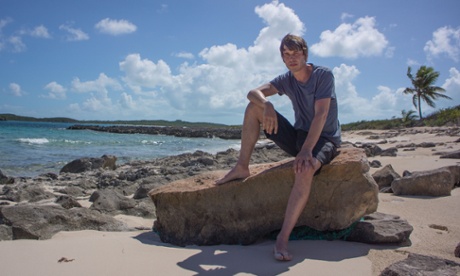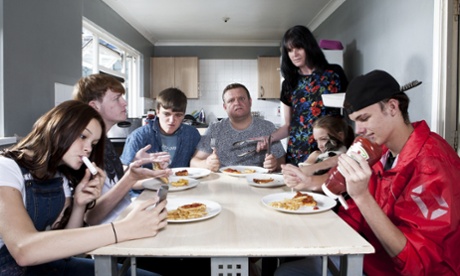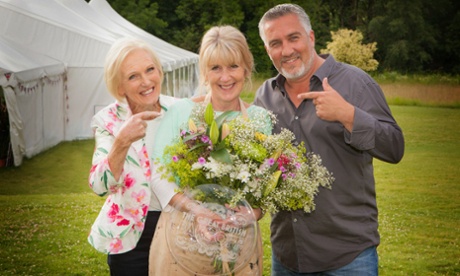
Peaky Blinders (BBC2) | iPlayer
Human Universe (BBC2) | iPlayer
The Kitchen (BBC2) | iPlayer
The Great British Bake Off (BBC1) | iPlayer
If there were a competition for the most unlikely drama success of recent years, you’d have to enter the one about Birmingham gangsters of the 1920s, starring an angelic Irishman as a Machiavellian Brummie villain and an avuncular New Zealander as a demonic Northern Irish policeman, and featuring a searing rock soundtrack and a canal boat as a getaway vehicle.
Say what you like about the first series of Peaky Blinders, but it didn’t look or feel like anything else. It was as if a city’s mythology was invented before our eyes, while someone forgot to close the studio door in which Later… with Jools Holland was being recorded.
In some sense that presented a problem for the second series, because the fruit of originality, no matter how distinctive, can quickly ripen into a mush of cliche. In the war against cliche, however, there are few more dependable allies than Tom Hardy, an actor who is reliably unpredictable whether he’s stuck behind a mask (The Dark Knight Rises) or a wheel (Locke).
Both those performances, of course, came in big-screen feature films, which is where you expect to see an avowedly cinematic actor like Hardy. Not behind a desk, playing a Jewish cockney distiller-cum-mob boss in a television drama about Birmingham gangsters in waistcoats.
Then again, with Hardy, as with Peaky Blinders, it’s worth remembering that old Kung Fu adage: always expect the unexpected. So there he unexpectedly was in the second episode of the new series, all beard and expletives, giving Cillian Murphy’s mournful eyes and bruised cheekbones a run for watchability.
In this particular struggle, of course, there was only going to be one winner. Murphy’s Shelby can make Clint Eastwood seem like a careless waster of words. What he does say is worth listening to, but it’s what he doesn’t say and the way the camera lingers on him while he’s not saying it that makes him such a captivating figure.
Along with Shelby’s unspoken thoughts, the big absence so far from this second series is Grace (Annabelle Wallis) or rather Grice, as Shelby tends to call her. The news was that she’s in Poughkeepsie, New York, which was almost as disappointing for this viewer as it was for the lovelorn Shelby.
He burned her letter unread, but seldom has romantic business looked more unfinished. Who’s to know if Grice will return in this gratifyingly mercurial drama? We are all just prisoners of dramatic anticipation, if for no other reason than that what Kung Fu never taught us was how to unexpect the expected.

Possibly the only adult on TV more babyfaced than Cillian Murphy is Brian Cox – the bright-eyed English physicist, that is, not the grizzled Scottish actor. In Human Universe, the former turned his formidable attention away from the cosmos – where in the vacuum of space, he reminded us, you’d be unconscious in 12 seconds – and looked instead at the only beings known to have ventured extraterrestrially: namely us.
And that could only mean some serious Earth-bound peregrinations. When Cox goes looking for answers, they’re rarely found in Slough or Daventry. Thus one moment he was in Star City in Russia, the next Petra in Jordan, the one after Addis Ababa, Ethiopia and on – why not? – to the Gulf of Aden. Perhaps it’s only in such locations that his brand of mind-boggling statistics – 80bn neurons in the brain, 100bn galaxies in the universe – can begin to match the epic sense of wonder that Cox emits as effortlessly as the rest of us breathe out CO2.
The story he told was of how humans evolved to a point at which a man could travel into space. His argument is that 200,000 years ago in Africa violent shifts of the land prompted an expansion of the human brain, so that it grew to about 1,500cc in size, “which is,” said Cox, “close to my brain size” – ie very big.
If you could take a child from 200,000 years ago in the Rift Valley, Cox argued, and subject it to a 21st-century education, “there is no reason it couldn’t… become an astronaut.”

That would be the easy part. The question is, what would that child make of The Kitchen, a fly-on-the-fridge series from the makers of Gogglebox, which follows eight British families in their kitchens? Because here was a show that proves beyond doubt that the infinite complexities of the British class system are alive and thriving. At least on the BBC.
George Bernard Shaw noted that an Englishman only had to open his mouth for some other Englishman to despise him. He was talking about what came out of the mouth. Now the telling point is what goes in.
Trout with watercress and tarragon if you’re the Garbutts in Cheltenham, but lots of frozen ready-made chicken meals if you’re the Barry-Powers from Cardiff. Fascinating socio-gastronomy? Not really. Unless you’re Hugh Fearnley-Whittingstall, there isn’t much in the end to say about food.
Lucy Garbutt isn’t HFW, but she did appreciate the attentions of the camera. And just to make sure it appreciated her, she wore a cowboy hat and scarf indoors in the middle of August. As a PR, she knew how the game works, and seemed all too happy to play it. Other contributors appeared more vulnerable to the sort of subtle sneering that left a bad taste in the mouth, not least the retired couple whose kitsch ornaments were subjected to snide cutaway shots.

There’s no such condescension in The Great British Bake Off, which may be a clue to its appeal. In the final Richard, the builder and five-time “star baker”, was warned about his viennoiserie. “This is very simple,” Paul glowered, as he considered the concept of pain au chocolat. “Too simple maybe.”
Simplicity is an increasingly worthless currency in Bake Off, where the principle now seems to be to produce grand-design cakes that most of us would not be sure whether to eat or place on a crazy golf course. Nancy holed-out with a Moulin Rouge windmill. She was speechless. There was, after all, nothing left to say.






